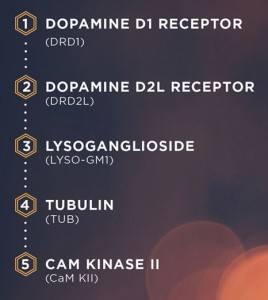Cunningham Panel
The Cunningham Panel™ assists clinicians in diagnosing autoimmune neuropsychiatric disorders.
The purpose of the Cunningham Panel™ is to provide laboratory results that assist physicians in diagnosing infection-induced autoimmune neuropsychiatric disorders. The panel measures the level of circulating antibodies directed against antigens concentrated in the brain, and measures the ability of these and other autoantibodies to increase the activity of an enzyme (CaMKII) that upregulates neurotransmitters in the brain.

The panel consists of five tests. Four of these tests provide results that are expressed as a titer, or final dilution, at which an endpoint reaction was observed on an Enzyme-Linked Immunosorbent Assay (ELISA) format. These tests measure circulating levels of autoantibodies directed against specific neuronal antigens, including: Dopamine D1 receptor (DRD1), Dopamine D2L receptor (DRD2L), Lysoganglioside GM1, and Tubulin. Autoimmune antibodies that bind to these targets may interfere or potentially lead to a blocking or stimulation of the function of these antigen. This, in turn, may trigger movement and neuropsychiatric disorders, along with OCD and abnormal neurologic behavior.
The 5th test, CaM Kinase II (CaMKII, Calcium-dependent Calmodulin Protein Kinase II) activation, produces a laboratory value (expressed as a numeric score) that reflects the percent above or below baseline CaMKII activity in a human neuronal cell line. CaMKII is a key enzyme that is involved in the upregulation of many neurotransmitters such as dopamine. CaMKII is also understood to increase the “plasticity” or sensitivity and responsiveness of neurologic receptors to neurotransmitters.


